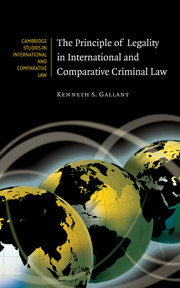Book contents
- Frontmatter
- Contents
- Explanatory Note on Spelling
- Acknowledgments
- Introduction
- 1 Legality in Criminal Law, Its Purposes, and Its Competitors
- 2 A Partial History to World War II
- 3 Nuremberg, Tokyo, and Other Postwar Cases
- 4 Modern Development of International Human Rights Law: Practice Involving Multilateral Treaties and the Universal Declaration of Human Rights
- 5 Modern Comparative Law Development: National Provisions Concerning Legality
- 6 Legality in the Modern International and Internationalized Criminal Courts and in the UN Trust Territories
- 7 Legality in Customary International Law Today
- Conclusion: The Endurance of Legality in National and International Criminal Law
- Appendix A Chart of Non-retroactivity Provisions in Criminal Law by Nations
- Appendix B Legality and Non-retroactivity Provisions as of 1946–47
- Appendix C Constitutional and Other National Provisions Implementing the Principle of Legality Today
- Bibliography
- Table of Authorities
- Index
- Afterword and Update
- CAMBRIDGE STUDIES IN INTERNATIONAL AND COMPARATIVE LAW
- References
5 - Modern Comparative Law Development: National Provisions Concerning Legality
Published online by Cambridge University Press: 04 July 2009
- Frontmatter
- Contents
- Explanatory Note on Spelling
- Acknowledgments
- Introduction
- 1 Legality in Criminal Law, Its Purposes, and Its Competitors
- 2 A Partial History to World War II
- 3 Nuremberg, Tokyo, and Other Postwar Cases
- 4 Modern Development of International Human Rights Law: Practice Involving Multilateral Treaties and the Universal Declaration of Human Rights
- 5 Modern Comparative Law Development: National Provisions Concerning Legality
- 6 Legality in the Modern International and Internationalized Criminal Courts and in the UN Trust Territories
- 7 Legality in Customary International Law Today
- Conclusion: The Endurance of Legality in National and International Criminal Law
- Appendix A Chart of Non-retroactivity Provisions in Criminal Law by Nations
- Appendix B Legality and Non-retroactivity Provisions as of 1946–47
- Appendix C Constitutional and Other National Provisions Implementing the Principle of Legality Today
- Bibliography
- Table of Authorities
- Index
- Afterword and Update
- CAMBRIDGE STUDIES IN INTERNATIONAL AND COMPARATIVE LAW
- References
Summary
This chapter examines how states have accepted various aspects of the principle of legality as a matter of law. These aspects include non-retroactivity of crimes (nullum crimen sine lege), non-retroactivity of punishments (nulla poena sine lege), requirement of a preexisting statutory text (praevia lege scripta), limitation or prohibition of special courts for crimes or retroactively created courts, and prohibition of collective punishments. It also looks at which states require retroactivity of more lenient punishment (lex mitior). It considers these materials in the context of the different legal systems in which they arise. It concludes with a section on the meaning of these national materials for international law.
CONTENT AND LIMITATIONS OF THE MATERIAL IN THIS CHAPTER AND THE APPENDICES ON NATIONAL LAW
The material used in this study of criminal law legality in national systems is collected in three appendices to this book. Appendix A lists in chart form the states that accept nullum crimen and nulla poena, and those that implement lex mitior. Appendix B lists the constitutional provisions, and in a few cases, other provisions, existing in 1946–47, after the end of World War II. Appendix C sets out the texts of the provisions as they exist today (or the most recent available texts). Appendix C also includes statutory and other material that has been found on these subjects in states where there are no constitutional materials.
- Type
- Chapter
- Information
- Publisher: Cambridge University PressPrint publication year: 2008

